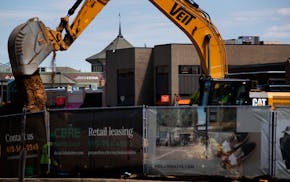During more than 30 years of police work, Ralph N. Hitchens displayed a fatherly concern toward recovering addicts, whom he often befriended.
"Even in retirement he maintained those friendships," said Dan Cain, who became friends with Hitchens 42 years ago, when Cain was in drug treatment.
"He was never one who would grant any special favors to anybody, but he also believed that people could change," said Cain, president of RS Eden, a social service program involved with treatment, sober housing and more. "With Ralph, there weren't any good guys or bad guys, there were just people who hadn't found their place yet."
Hitchens, of Minneapolis, died May 8 at age 88.
He had served as a police chief in Litchfield and Brainerd, and before that, as a Minneapolis officer who became supervisor of the narcotics squad, among his various details.
U.S. District Judge Ann Montgomery met Hitchens when he was a Minneapolis narcotics officer on a task force and she was a federal prosecutor. Hitchens "had an unusually big heart," and was able to differentiate those addicted from others that were involved with drugs for profit and willing to victimize others.
"He was a very kind, compassionate guy," Montgomery said. "He was kind of everybody's father figure with smoking a pipe and gray hair at a very early age. He was a very paternal, compassionate, thoughtful officer."
Michael Campion, former commissioner of the Minnesota Bureau of Criminal Apprehension, was a narcotics officer when he worked on the same task force with Hitchens in the 1970s.
A cut above a lot of officers at the time, Hitchens was "community policing" before it was in vogue, Campion said. "He was a very good role model, had a lot of integrity, just somebody who in my mind really stood out," Campion said, noting his "wonderful way with people and classy professionalism."
Hitchens had relationships with the sort of people that most officers would not befriend, Campion added.
"His ability to deal with people was terribly effective. He certainly was forward-thinking. … He had a broad view of the world."
Hitchens was born to Canadian parents when they were staying in Minneapolis while his father worked as a bricklayer. After Ralph's birth, the family moved back to Winnipeg, said daughter Denise Caputa.
At 17, Hitchens returned to Minneapolis to join the U.S. Navy. He later attended the University of Minnesota and washed dishes at the Fiesta Cafe, where he met Jean Kevelin, a beauty-school student and waitress. They married in 1948 and had five children.
Hitchens was hired as a patrolman in Minneapolis in 1950. He left the Police Department in 1966 for seven years to become a partner in Duffy's Nightclub downtown, then returned to the police force.
Montgomery, a Litchfield native, recommended Hitchens for police chief there after she heard he was retiring from Minneapolis police, where he'd been a beat cop, sergeant, lieutenant, detective and head of the narcotics and morals squad.
Back then, he warned of opiate dangers and pushed for stricter regulation of codeine-based cough syrups, too.
Hitchens served nearly five years as Litchfield chief, then became Brainerd chief in 1983. He acted in local plays, loved hockey and wrote poetry, too.
"He always believed in the best in people, that you could learn from your mistakes and go on," Caputa said.
Hitchens was preceded in death by Jean, his wife of 65 years. Survivors include siblings Lil McKinnon and Len Hitchens; children Nowell Hodnett, Shelly Madden, John Hitchens, Cheryl Earley and Caputa; nine grandchildren and 12 great-grandchildren.
Services have been held.

Lacrosse 2024: Boys or girls, discussion begins in the same place

Will 'shotgun only' zone for deer in southern Minnesota be abolished?
One killed in head-on crash in Coon Rapids

Edina could see first zoning update in 50 years

